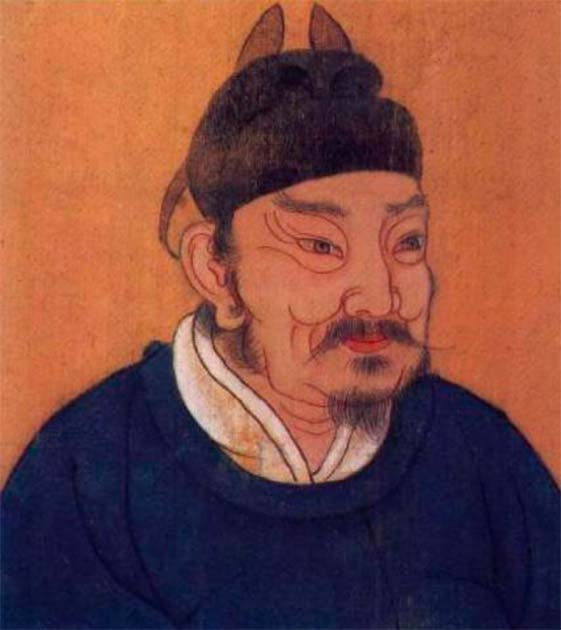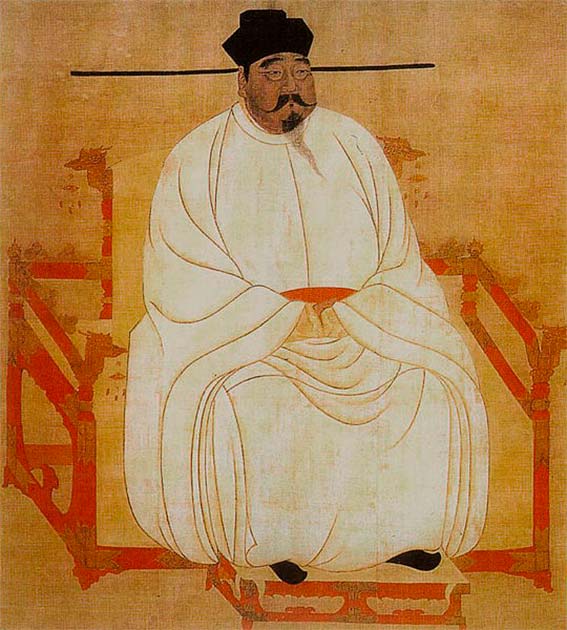Emperor Taizu of Song was born on the 21st of March 927. His personal name was Zhao Kuangyin, but he also had a courtesy name Yuanlang. Taizu is in fact an honorific, and a common one for those who found a Chinese dynasty. This man will be referred to here as Taizu to avoid confusion.
He is known for being the founder and first ruler of the Song Dynasty in China. His reign was from 960 until his death in 976.
As a distinguished military general of the Later Zhou dynasty, Taizu came to power through a coup where he forced Emperor Gong to abdicate the throne. Throughout his reign, he sought to expand his empire and conquer the Southern Tang territories, the Later Shu lands, the Southern Han and Jingan before uniting most of China through military administration.
A Soldier’s Life
Born in 927, Taizu was the son of a military commander named Zhao Hongyin and was given a military upbringing. It was said that he excelled at mounted archery.
One story has him riding on an untamed horse without a bridle until he is knocked off the horse by the city gate. Not to be stopped by a mere bang on the head, Taizu climbed straight back up and chased the horse, subduing it without any harm.
In the mid-940s, Taizu was married to Lady He. It was an organized marriage by his father. However, little else is known about his marriage to Lady He.

It is recorded that he wandered in this period until 949 when he joined the army of Guo Wei, a military governor of the Later Han dynasty. He was part of the military force that helped to quell a rebellion organized by Li Shouzhen.
In 951, the Guo Wei rebelled and became the Later Zhou dynasty. Taizu had proven himself in the two years that he had served in the army so when this rebellion came, he was promoted to palace guard commander.
- Ahuitzotl: Did we Finally Find an Aztec Emperor’s Tomb?
- The Tragic Love Of Yang Guifei and The Emperor Of China
Emperor Chai Rong spent much of his time with the Guo Wei and became interested in Taizu. He was impressed by his martial skill and military potential. Taizu was made a commander of the cavalry units and began to make more of an impact on the political scene.
Taizu’s career in military command began as the commander of the cavalry. He started to impress properly at the Battle of Gaoping against an alliance of the Northern Han and Liao dynasties.
When Chai Rong ascended the throne, Liu Chong decided to ally with Liao’s dynasty as he was concerned about the power of Chai Rong. In the opening battle, the army’s flank led by Fan Aineng and He Hui was defeated.
Taizu evaluated the situation and led 4,000 elite troops from the Palace to counter this onrushing army under Liao. Taizu was such an inspiration that to his troops that the Guo Wei army were no0ted as fighting with a great fervour for victory, something Taizu shared.
Taizu was raised as a champion for his victory at the Battle of Gaoping. He was promoted again to the grand commander of the palace guards and was entrusted to train and organize them.
Through this, he developed a personal and lasting relationship with the soldiers. Not only this, Taizu, also became familiar with the generals and officials that would often come to the palace.
This included the Chief of the Palace, and other military generals named Shi Shouxin, Wang Shenqi, and Wang Zhengzhong. It did not take long for Taizu to seize control of the guards and have entrenched relationships with many high-ranking officials. Within a few years, Taizu had established a set of officials under him who were military general, loyal and in important positions.
The final promotion that Taizu was to be given, was that he was promoted to Jiedushi (Overall Military Governor). Despite this, he still had two rivals: Zhang Yongde and Li Chongjin.
In 959, Taizu sought to bring down his rivals and was successful in getting Zhang Yongde demoted. Li Chongjin fortunately for Taizu lost political backing when Chai Rong died. This left Taizu in a perfect position to exert his influence further.
In 960, Taizu was sent to combat the potential alliance of Northern Han and the Liao dynasty. On this trip, Taizu’s prophet within the army declared that he saw two suns fighting and this meant that the power of the empire should be entrusted to Taizu.
- Where Truth Meets Legend: Was Jimmu the First Emperor of Japan?
- That Time Sun Tzu Raised an Army of 180 Prostitutes
This was massively supported by his arm, who oved their general who had led them to such victories. According to legend, Taizu took power under pressure from his army. He returned home to be declared emperor without facing any resistance. He sent the dethroned emperor to live with his mother in the Western Capital.
The Death of an Emperor
In 960, Taizu was able to reunite China under his rule, ending almost 50 years of division. This included most factions except the territories of the Northern Han.

In 968, Taizu went to war against them but was forced to retreat. He was remembered for his expansion and his imperial examination system that made the civil service only accessible to those who could complete the exams. This professionalism led to economic growth and advances in scientific pursuits.
Taizu reigned for seventeen years, dying at the age of 49. Interestingly, he was succeeded by his younger brother rather than his sons who were of age.
This is said to be because of the role of Taizu’s mother and that it had been accepted for a generation that his brother would succeed him. This story is known by a particular name: “shadows by the candle and sounds from an axe”.
It has been suggested that these enigmatic words mean Taizu was murdered by his brother who wanted to rule himself. There is no other evidence to support this claim, to be sure, but the phrase is telling and the meaning remains otherwise obscure.
Taizu was buried in the Yongchang Mausoleum near Gongyi. When his brother passed away, the succession was passed on through his sons rather than through Taizu.
However, they would get their chance to rule in the 12th century when no heir could be produced and so the government reverted back to Taizu’s line of succession. Taizu’s line lasted for generations.
Top Image: Emperor Taizu plays a ball game with his advisors. Source: Qian Xuan / Public Domain.
By Kurt Readman